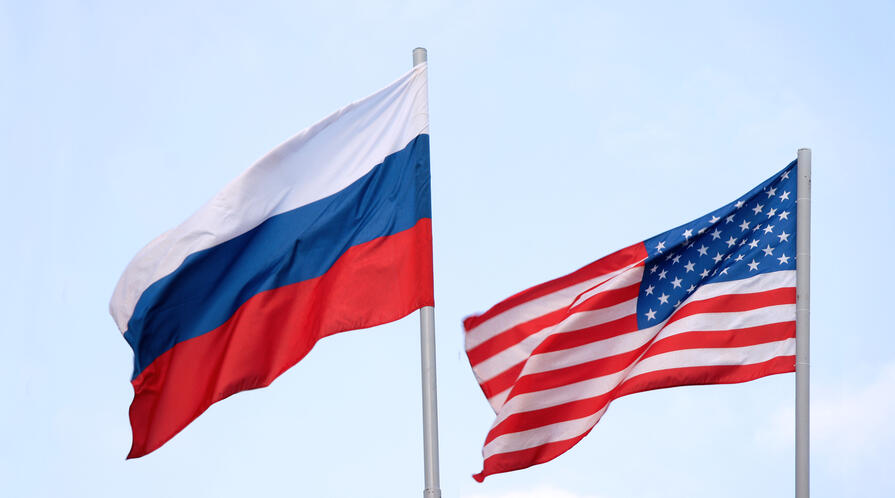Displaying Weakness to the Kremlin
Displaying Weakness to the Kremlin
For a U.S. administration claiming that it wants to restore American power in order, among other things, to negotiate from a position of strength, the past week has not advanced the cause.

For a U.S. administration claiming that it wants to restore American power in order, among other things, to negotiate from a position of strength, the past week has not advanced the cause. President Donald Trump and senior cabinet officials took positions that the Kremlin will read as displaying weakness, not strength.
Start with the president. Trump has been giving Russian leader Vladimir Putin “two weeks” to show that Russia intends to negotiate seriously to end its war with Ukraine since late April. His latest “two weeks” to show whether Putin was “tapping us along” ran out on June 11.
What has Moscow been doing? It has not altered its maximalist negotiating demands. Seeking Ukraine’s total capitulation does nothing to move negotiations forward. Russia instead has launched massive missile and drone attacks on Kyiv and other Ukrainian cities.
The two leaders spoke by phone on June 14, mainly about Israel and Iran. Later on social media, Trump wrote that he had devoted little time to the Russia-Ukraine war in the call, consigning that discussion to the coming week (another two weeks for Putin?). Neither the White House nor Kremlin read-outs of the call suggested that Trump had pressed Putin on Ukraine or threatened any consequences if the Kremlin did not alter its current policy course.
Trump’s administration continued to oppose a proposal put forward by the European Union and Britain for the G7 to agree to lower the price cap for Russian oil from $60 to $45 per barrel. Trump left the G7 summit in Canada a day early, after resisting a push by the other G7 leaders to apply new sanctions on Russia. Trump complained that the sanctions would prove too costly for America, though it is unclear how lowering the price that Russia receives for oil would cost the United States a single dime. In the end, the G7 summit issued no statement on Ukraine, reportedly due to Trump’s opposition.
While Trump has expressed unhappiness with Putin, he has done nothing substantial to penalize Russia’s recalcitrance. Putin clearly believes he can string the U.S. president along while continuing to make war on Ukraine. Trump only reaffirmed his weakness this past week.
Meanwhile at the State Department, Secretary Marco Rubio apparently thought it appropriate to issue a congratulatory message on Russia’s national day (June 12), something that American officials had not done for three years. Some Rubio defenders pointed to then-Secretary Antony Blinken’s 2022 message, but Blinken’s message, unlike Rubio’s, sharply rebuked Russia for both internal repression and its war against Ukraine.
Rubio’s message falls in line with the kid glove treatment the State Department has taken toward Russia under his leadership. The Department is pursuing talks on normalization of U.S.-Russia relations and has repeatedly opposed language in G7 statements and UN General Assembly resolutions that name Russia as the aggressor in the Russia-Ukraine war.
Rubio also serves as Trump’s National Security Advisor. On June 17, the press reported that an interagency working group charged with developing strategies for pushing the Kremlin to accelerate negotiations with Kyiv had been disbanded. The reason: Trump’s disinterest in pressuring Moscow.
Secretary of Defense Pete Hegseth’s hearing on Capitol Hill on June 13 did little to suggest a robust American position regarding Russia. Hegseth declined to say that he supported Ukraine in its fight against Russia and then had a perplexing exchange with Congressman Salud Carbajal. Carbajal asked whether Hegseth would recommend the United States fulfill its commitment under Article 5 of the NATO Treaty to defend a NATO ally invaded by Russia:
Hegseth: “Well, Russia has not invaded NATO allies …”
Carbajal: “No, no, no, no, no, no, no ... I reclaim my time. Yes or no, it’s that simple.”
Hegseth: “There’s Article Five in NATO, which we recognize.”
Carbajal: “So is the answer yes or no?”
Hegseth: “That’s what Article Five is, yes.”
Hegseth finally got the answer right—on his third try. His first answer should have been an unequivocal “yes.” Washington should want the Kremlin to believe that U.S. military power would respond were Russia to attack a NATO ally. That is key to deterring Moscow from ever conducting such an assault in the first place.
Putin may already harbor doubts regarding Trump’s commitment; recall Trump’s February 11, 2024 statement that the Russians could do “whatever the hell they want” to allies who fell short on meeting NATO’s defense spending targets. Hegseth’s reluctance to say “yes” from the start will only fuel Kremlin doubts, and that undermines deterrence.
All-in-all, not a good week for the administration’s approach toward Russia. Putin and other Kremlin officials certainly took note. They see weakness, which they will attempt to exploit against both America and America’s partners.
